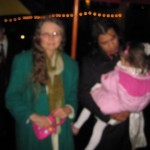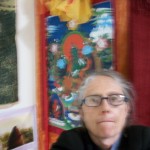I love reading murder mysteries because they are like puzzles to be solved — and because, in these books, there are always wrongs to be righted and Justice to be served. And the constant efforts of murder-mystery heroes to identify and capture the bad guys fit right in with my own life-long passion for Justice, especially in politics. Who dun it? “Karl Rove!”
When I attended BoucherCon, a convention of mystery writers and mystery readers held in San Francisco recently, one facet of the conference that I really liked was when several famous murder-mystery authors spoke to us groundlings about how they went about writing their books. Here’s what I learned from the following authors:
EDDIE MULLER, San Francisco’s current Czar of Noir: “I wrote about 1940s San Francisco because I wanted to recapture a place that no longer exists. It was my father’s town and I wanted to live his life vicariously — World War II, Dashell Hammett, the Barbary Coast. My father was actually born in Golden Gate Park after the 1906 earthquake. This was a whole part of San Francisco that I never got to experience myself but only heard stories about.” And so he wanted to write some of those stories down before they got lost forever — that was his motivation to write. (My powerful original motivation for starting to write was that I was completely pissed off at George W. Bush for stealing the 2000 election. Now there is one who-dun-it that no one seems to want to solve.)
“My job is to make sure that the things of the past don’t disappear. I write in order to preserve this past for future generations. I write for five-year-olds. And, in addition, if you can possibly do as an adult the things that you loved to do as a six-year-old, you’ll be fine. And my best subject in elementary school was Show and Tell. You have to find something that you really want to write about. You become curious about a character and a time.” And also about how the events of the day shapes a character’s world.
“My publishers were very upset with me after a while because they wanted me to keep writing books like my first ones. But my passion had moved on.” You have to have passion about something in order to write well about it. “It’s very hard for me to just sit down and write about something. It’s got to have a visceral spark for me to do it — one where I can’t eat or sleep until I do it.”
Short stories are easier to write than novels, according to Muller. “That’s because novels have their finish lines way off in the distance. And talking your stories out is also part of the writing process. You need to try as hard as you can to make your characters distinctive. Dialog is always at the service of developing character — in every dialogue you should be able to distinguish who is talking by the tone of what they say, even without attributions such as ‘he said’ or ‘she said’.”
Muller also said that it was easier to write a novel if you do it a chapter at a time. “I always write little mini-novels, about 20 pages ahead of where I am, because I think you need to leave space for zig-zags. A writer, unlike a pilot who always flies from Point A to Point B, constantly needs to leave his comfort zone. Tell the story you want to tell, not just follow the formula. Don’t be afraid to get out of your comfort zone.
“In my novels, I’ve tried to reclaim the hard-bitten dialogues of the 1940s without turning them into parody. Newspaper reporters from that time knew how to relate the facts in the shortest time possible and it is this timing that I’m trying to reclaim. That’s how newsmen wrote back then.”
Muller loved the old newspaper days. “There is nothing more impressive than an old-time newspaper office. The cacophony and urgency of those old newsrooms is gone. My dad worked for William Randolph Hearst and I myself took a job at the Chronicle because I wanted to be there when that behemoth went down. Now no one even goes to the office any more. Work is done at home. The Chronicle is still being published today but it’s just not the same. The romance is gone.
“Face it. Romance happens when people interact. And that just doesn’t happen any more. Everything now is done at home. Bars and theaters and public places are where people interact.” Now people just use the internet and rent videos.
“Always remember that It’s not how you spend your money that is important — it’s how you spend your time.”
Then Muller defined the “Noir” concept for us newbees. “In true Noir, it’s when fate is indifferent and the protagonist knows that he is doing wrong — and does it anyway. He has a tendency to self-destruct. Noir makes you feel the anxiety and despair of these people who knowingly do wrong. Thus Noir can happen anywhere. It doesn’t just happen in the Tenderloin. It also happens in the nicest part of town.”
DAVID BALDACCI: As a lawyer, I did the same thing that I did later as a writer — tell a story. It’s all about words. You do the research and then you tell the story. Transitioning between being a lawyer and being a writer was smooth. And your reader is like your jury.” I agree. I used to write personal injury settlement briefs — which is just like writing soap opera.
“I do a lot of research but don’t use 99% of it. Then after you have all the points down, you shorten it. Your final product should be all muscle, no fat. If it doesn’t describe a character or advance the plot, take it out. Distill it down to the best stuff — from 100 pages down to one paragraph if need be. But you still need to do the research.” I myself hate research — but Baldacci apparently thrives on it.
“One time I went out on a police patrol doing research and the policeman busted five criminals. And I swear this happened. As one of the criminals was lying there on the ground in handcuffs, he looked up at me and said, ‘I love your books!’ It really happened.”
When Baldacci was a lawyer, he saw a lot of justice not being done. “All of my books are about seeking justice. Sometimes my characters find it and sometimes they don’t.”
And none of Baldacci’s heroes are perfect — just as none of his villains are totally bad. “My villains can rationalize any behavior they commit. They are not a part of society so why should they care about society? And while 99% of us have a societal inhibitor that prevents us from acting on our feelings, some of us don’t. Look at Ted Bundy. His brain was just freaky. But most other villains are motivated because they have been left out of society.” Yeah, like most of Americans have been left out of the global corporatists’ grand schemes for MY country. But does that make us villains too? Hopefully not.
“My brain is always going on stories. You can’t turn it off — always thinking about writing. Even now. It’s absolutely never turned off. Wherever you go, whoever you meet, it’s all fodder for stories.”
Regarding inspiration, “The spectacular ideas, the Eureka moments, the epiphanies don’t happen often. I get ideas and extrapolate on them and distill and increase them so they will amount to a 400-page novel that someone other than your mother will read.”
Regarding many writers’ lack of self-confidence, Baldacci was hopeful. “I’m still fearful about my abilities, but that is a great combatant to complacency. Every book I write is like my first one. If you do this, you write a better book. But all people in the creative business have to have a high level of confidence. To put yourself out there to strangers is hard. Who do you write for? Your readers? No. I write for myself — not what sells, not what’s hot. I ask myself, ‘Do I want to spend a year of my life with this? Is this stuff cool?’”
Baldacci’s latest book is called “Hell’s Corner” and it’s about his regular group of characters, the Camel Club. “And it’s all smoke and mirrors, which is what Washington DC is all about. It’s my tip of the hat to DC.” Baldacci also talked about his favorite charitable project — trying to get more books into the homes of poor children.
LAURIE R. KING: “Sherlock Holmes is a terribly useful guy [for juicing up a plot]. I got about two lines into my first Mary Russell book and thought, ‘Oh crap. I really should learn more about Holmes.’” And apparently she did. I love king’s series about Mary keeping bees with Sherlock and later becoming his wife.
“I first sat down to write when my son had just gone off to pre-school for three glorious days a week. I wrote my first book on paper, typed it up and sent it off. Publishers’ reaction? Silence. I was such an ignoramus when I first started submitting manuscripts. I didn’t have an agent. Many publishers don’t take unsolicited manuscripts. I sent the thing out to publishers for three years with no luck, and then the Linda Allen agency took me on and I started selling manuscripts — but it only took me six years from writing my first book to its publication.” And it’s even rougher now to find a publisher than it was back then.
Sometimes readers stop and ask, “Would a character really do that?” Apparently books that have too many weird things happening in them usually don’t work. But the Mary Russell series certainly does.
JOSEPH FINDER: “My standards for what I write have grown higher over the years. Unfortunately, however, my skills have remained the same — except that now I have a better sense of structure and a better idea of what I’m trying to do. And being a published author now and doing all that it entails takes away from my writing time.”
Regarding having a book turned into a movie, Finder said, “I’ve sold a number of books to Hollywood that never got made into films. In Hollywood, writers are so low on the totem pole that they are below the ground. One time I tried to get an acting part in my movie [like Hitchcock did] and that was really strange. In Hollywood, they have a false respect for novelists but they mistrust us. Once, someone actually told me that I didn’t understand what my own novel was even about. They leave out all the good novelistic stuff in my books there, so now I just write what I think they will cut out. First they buy the script. Then they laugh at it. I don’t need that.”
And Finder actually likes to do research for his novels too. “When writers go to a place to do research, we go with heightened senses. But research is a dangerous drug for me. I love research. It’s like heroin. I start out with insecurity, knowing not much. And what you learn, you can’t show it off — it’s only the tip of the iceberg of what finally ends up going into the book.” I hate research.
“I read Robert Ludlum and John Forsythe when I was just starting out. I read a whole bunch of different thrillers. As writers, we start out imitating someone else and then we find our own voice.”
But Finder doesn’t waste his time writing on subjects that are familiar to him. “I hate the advice, ‘Write what you know.’ That’s crap. I always write what I want to find out. And someone said, ‘Suspense is undermined by humor.’ Screw that. I want to write what I want to write. Write what you like to write. If it clicks in the marketplace, that’s a plus. If publishers don’t like it, too bad.” Totally!
“The biggest struggle is actually just sitting down to write. But you have to keep writing because once you get into it, it’s really wonderful. I wish someone had told me that the first book is not the end-all and be-all. Just keep writing! But I still fear the empty document screen. Just shut everything else off and write. But if you get blocked, just take a look at your outline the night before, sleep on it and work on it in the morning.”
I’ve heard that before — that our brains sort stuff out for us in our sleep and we do our best creative work when we first wake up in the morning because our brains have already done most of the dirty work for us while we slept.
ANDREW KLAVAN: At first I wasn’t going to review Klavan’s suggestions on writing because I didn’t agree with his politics. However I have changed my mind about that. Why? Because of something that some guy I correspond with on the internet said recently. Internet Guy and I have such completely polar opposite views about how America should be run that, frankly, I almost hate him. I mean really! Teabaggers like him have just sold out our country to foreign interests and global corporations solely because the Supreme Court decision regarding Citizens United now allows our former democracy to go to the highest bidder — whoever can pay for the most libelous and mendacious campaign ads. But I digress.
Anyway, I thought I would NEVER have anything in common with Internet Guy, who I considered to be a completely ignorant schmuck, a willing victim of corporate brainwashing — but then I suddenly discovered that he and I were both murder-mystery fans! So maybe Internet Guy isn’t such a dumby after all (except for in politics of course, where he is clueless). And so perhaps I should give Klavan a chance too.
“I like screenwriting because it gets me out of the house,” said Klavan. “Writing novels is a lonely business — but I still love writing them. But the results of writing for Hollywood are so random. Sometimes they are good, sometimes bad.”
Klavan’s influences? “Raymond Chandler. He is the portrait of what a man should be like. And when I was 19, I read ‘Crime and Punishment’ and it changed my life. Someone just said of my latest book, ‘It’s like Chandler meets Dostoevsky.’ And I started out with no mentors, just walking around New York City with a manuscript box under my arm, literally getting thrown out of publishing offices.” Apparently this is the story of every writer’s life.
“One of the dangers of writing is that other stuff that you need to do keeps creeping in and grabbing up you time. I’ve been setting aside four hours a day to write since I was 14. And I still have to do that.”
MARTIN CRUZ SMITH: This man is one of my favorite writers — him and Janet Evanovich. “Writing is harder for me these days. It seems like everything interrupts me now. There’s either too much noise — or else too much quiet.”
Regarding Hollywood? “Hollywood has a technique that is debasing. It’s like you have a raincoat, they take it, jump up and down on it and throw it in the gutter. After that, do you really want it back? One main actor even apologized to me for what they did to my book.”
Regarding research? We have to evoke Donald Rumsfeld when we write — we have to know what we don’t know. The key to a good research interview is to just listen. Let it flow. I went to Russia to write and Moscow was such a fantastic city that I had to throw away my planned American character for a Russian one.”
Smith was most influenced by “The Spy Who Came In From the Cold,” and James Caan is his favorite American writer. “You have to find those tiny little bits of detail that come together and make the character come to life. My advice is to don’t listen to anyone else, just write. Write until your butt is sore. Stay home from those writers’ conferences and just write.”
And as a writer, you have to be hyper-aware. “A pitcher sees only home plate — but a writer see everything. And you put everything into your book.” And then you go out and look for a publisher — and press your luck.
LEE CHILD: He was at the convention too, mingling. Unlike some other writers, Child seems to like mingling with his fans. I saw him in the hotel lobby. He’s really tall. But I missed his presentation because I was off babysitting Mena the Kid. However, I am now reading his books and trying to catch up on his hero Jack Reacher, the impossibly perfect man, almost an American version of James Bond.
Lately I’ve been reading a lot of international-spy-ring, CIA assassination, testosterone-laced who-dun-it types of murder mysteries, as a result of learning about them (and getting free copies of them) at BoucherCon — and also because I’m still trying to figure out what is REALLY going on in that clandestine American nether-world of black ops, assassinations, skulduggery and unaccountability that most of us Americans know nothing about — but still have to pay for. And this type of mystery writer lets us in on the ground floor of what is really going on behind all those closed doors. And it ain’t pretty. Or democratic. Or American. But Karl Rove would definitely approve.
****
To see photos of the murder-mystery authors and Clifford the Big Red Dog giving Mena an interview, click here: http://jpstillwater.blogspot.com/2010/11/tips-from-famous-crime-writers-solving.html





